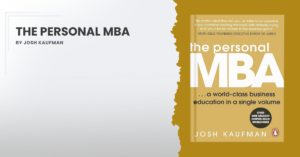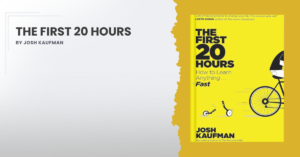Title: The Lean Startup
Author: Eric Ries
Year: 2011
Pages: 320
The Lean Startup by Eric Ries offers an innovative approach to launching new products and businesses.
Eric Ries develops all the concepts of The Lean Startup methodology in order to radically increase the chances of success for all those who wish to start their own business or develop a new project through continuous innovation.
As a result, I gave this book a rating of 8.0/10.
For me, a book with a note 10 is one I consider reading again every year. Among the books I rank with 10, for example, is Dale Carnegie’s How to Win Friends and Influence People.
Reasons to read The Lean Startup
Data-Driven Decision Making
Validated learning empowers entrepreneurs to make data-driven decisions, reducing reliance on guesswork and gut instincts.
Adaptability
The concept of pivoting or persevering based on customer feedback and market conditions encourages entrepreneurs to stay nimble and adaptable in the face of uncertainty.
Minimize Risk
By focusing on rapid iteration and experimentation, entrepreneurs can minimize the risks associated with launching new products or services.
Book Overview
Inspired by lessons from lean manufacturing, it relies on “validated learning,” rapid scientific experimentation, as well as a number of counter-intuitive practices that shorten product development cycles, measure actual progress without resorting to vanity metrics, and learn what customers really want.
It enables a company to shift directions with agility, altering plans inch by inch, minute by minute.
The real secret would be creating things that people want to buy in the first place. Startups generally fail not because of missed deadlines, faulty products or blown budgets, but because entrepreneurs are too focused on their vision, on their great new idea, and don’t know what it is that their customers really want.
The solution, according to this book, is lean thinking and validated learning. Rather than designing an elaborate business plan and committing large amounts of financial and human resources from the start, first find out what you can about your potential customers.
And rather than adopting a static, product-centric approach, test your idea on your customers: respond to their feedback, and constantly be prepared to adjust your product, as well as your business.
The Lean Startup outlines key principles for successful startups, such as:
- Start with a clear vision and purpose.
- Test and validate ideas quickly.
- Use customer feedback to refine products and services.
- Focus on learning rather than achieving specific goals.
- Develop a culture of experimentation and continuous improvement.
- Measure progress and performance.
The point of a startup is to get through the Build-Measure-Learn cycle as quickly as possible to figure out what your customers will pay for.
The Lean Startup also incorporates customer feedback into the productivity equation. After creating an initial product, further iterations must incorporate customer responses to the product.
- Start Small and Iterate: Rather than aiming for perfection from the outset, entrepreneurs should focus on launching a minimum viable product and iterating based on customer feedback.
- Measure What Matters: Instead of getting bogged down in vanity metrics, entrepreneurs should focus on measuring key metrics that indicate progress and success.
- Experiment Often: Entrepreneurship is inherently risky, but by conducting frequent experiments and learning from both successes and failures, entrepreneurs can increase their chances of success.
- Be Customer-Centric: Building a successful business requires a deep understanding of customer needs and preferences. By prioritizing customer feedback and engagement, entrepreneurs can create products and services that resonate with their target audience.
Strongly based on widespread practices such as Lean Thinking, Customer Development, Agile Methods, Business Model Generation, MVP, and many other concepts, Lean Startup refers to a group of scientific methods to reproduce the success of well-known startups instead of just developing a system and “seeing how it goes”.
The Lean Startup Method:
- Entrepreneurs are everywhere – Huge companies can (and should) have entrepreneurs
- Entrepreneurship is management
- Validated Learning – Startups exist to learn how to build a sustainable business
- Build-Measure-Learn – Run through this loop as fast as possible
- Innovation accounting – how to measure progress and prioritize work
Through a blend of practical advice, real-world examples, and a relentless focus on experimentation and customer feedback, Ries challenges conventional thinking and offers a roadmap for sustainable growth and innovation. By embracing the lean startup methodology, entrepreneurs can minimize risk, maximize learning, and create products and services that truly resonate with their target audience.
What are the Key Ideas
Lean Startup Methodology
Embrace rapid iteration, experimentation, and customer feedback to build successful businesses.
Build-Measure-Learn Feedback Loop
Launch a minimum viable product, measure customer responses, and learn from feedback to drive continuous improvement.
Customer-Centricity
Prioritize customer needs and preferences, leveraging their feedback to guide product development and decision-making.
Learn from Failure
View failure as an opportunity for growth and learning, adjusting your approach based on lessons learned.
What are the Main Lessons
Pivot or Persevere
When faced with challenges or setbacks, entrepreneurs must be willing to pivot their business model, product, or strategy based on feedback from customers and market conditions. It’s also important to recognize when to persevere and stay the course, especially if there’s evidence of potential success in the long run.
Validated Learning
Rather than relying on gut instincts or market research alone, entrepreneurs should gather empirical evidence to validate their ideas and make informed decisions. By continuously testing and adapting their strategies, entrepreneurs can minimize the risks associated with building a new business.
Feedback Loop
Instead of spending months or years developing a product in isolation, entrepreneurs are encouraged to build a minimum viable product (MVP) and release it to customers as soon as possible. So, doing that you can follow the build-measure-learn cycle.
My Book Highlights & Quotes
This is one of the most important lessons of the scientific method: if you cannot fail, you cannot learn.
We must learn what customers really want, not what they say they want or what we think they should want.
The only way to win is to learn faster than anyone else.
What differentiates the success stories from the failures is that the successful entrepreneurs had the foresight, the ability, and the tools to discover which parts of their plans were working brilliantly and which were misguided, and adapt their strategies accordingly.
As you consider building your own minimum viable product, let this simple rule suffice: remove any feature, process, or effort that does not contribute directly to the learning you seek.
We adopted the view that our job was to find a synthesis between our vision and what customers would accept; it wasn’t to capitulate to what customers thought they wanted or to tell customers what they ought to want.
A startup is a human institution designed to create a new product or service under conditions of extreme uncertainty.
The goal of a startup is to figure out the right thing to build—the thing customers want and will pay for—as quickly as possible. In other words, the Lean Startup is a new way of looking at the development of innovative new products that emphasizes fast iteration and customer insight, a huge vision, and great ambition, all at the same time.
Lean thinking defines value as providing benefit to the customer; anything else is waste
Validated learning is the process of demonstrating empirically that a team has discovered valuable truths about a startup’s present and future business prospects.
The value hypothesis tests whether a product or service really delivers value to customers once they are using it.
If we do not know who the customer is, we do not know what quality is.
Leadership requires creating conditions that enable employees to do the kinds of experimentation that entrepreneurship requires.
The big question of our time is not Can it be built? But Should it be built? This places us in an unusual historical moment: our future prosperity depends on the quality of our collective imaginations.
Strongly based on widespread practices such as Lean Thinking, Customer Development, Agile Methods, Business Model Generation, MVP, and many other concepts, Lean Startup refers to a group of scientific methods to reproduce the success of well-known startups instead of just developing a system and “seeing how it goes”.
In conclusion, The Lean Startup by Eric Ries provides an effective roadmap to launching successful startups.
Not only does Ries provide insightful advice and strategies to help entrepreneurs succeed, but he also offers practical tips to help them stay agile and focused.
With its actionable advice and case studies, the book will undoubtedly leave readers with the tools they need to make their startups successful.
I am incredibly grateful that you have taken the time to read this post.
Do you want to explore more?
Check my main categories of content below:
- Agile
- Blog
- Book Notes
- Career
- Leadership
- Management
- Managing Yourself
- Productivity
- Project Management
- Technology
- Weekly Pulse
Navigate between the many topics covered in this website:
Agile Art Artificial Intelligence Blockchain Books Business Business Tales Career Coaching Communication Creativity Culture Cybersecurity Design DevOps Economy Emotional Intelligence Feedback Flow Focus Gaming Goals GPT Habits Health History Innovation Kanban Leadership Lean Life Managament Management Mentorship Metaverse Metrics Mindset Minimalism Motivation Negotiation Networking Neuroscience NFT Ownership Parenting Planning PMBOK PMI Politics Productivity Products Project Management Projects Pulse Readings Routines Scrum Self-Improvement Self-Management Sleep Startups Strategy Team Building Technology Time Management Volunteering Work
Do you want to check previous Book Notes? Check these from the last couple of weeks:
- Book Notes #124: Radical Candor by Kim Scott
- Book Notes #123: The Personal MBA by Josh Kaufman
- Book Notes #122: The First 20 Hours by Josh Kaufman
- Book Notes #121: A World Without Email by Cal Newport
- Book Notes #120: Storynomics by Robert McKee and Thomas Gerace
Support my work by sharing my content with your network using the sharing buttons below.
Want to show your support tangibly? A virtual coffee is a small but nice way to show your appreciation and give me the extra energy to keep crafting valuable content! Pay me a coffee:




